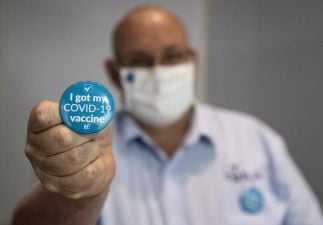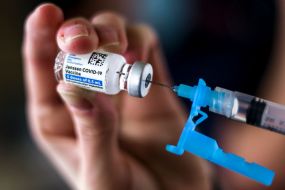People aged in their 40s will be given the choice of using the AstraZeneca and Johnson & Johnson vaccines, but under strict conditions.
Following advice from the National Immunisation Advisory Committee (Niac), the age limit for the two vaccines is being reduced from 50 to 40 years, HSE chief clinical officer Dr Colm Henry has confirmed.
Niac, which made recommendations to chief medical officer Dr Tony Holohan over the weekend, considered the administration of the two vaccines to people in their 40s “with some conditions attached,” he said.
Dr Holohan is understood to have endorsed Niac’s recommendation to the Government. The HSE has now been asked how to operationalise the proposals.
The recommended conditions would include ensuring people have full information about any potential risks and ensuring the two vaccines could be administered to younger people at a quicker pace than the Pfizer or Moderna vaccines, Dr Henry said.
The safety concerns surrounding the vaccines come after the European Medicines Agency (EMA) confirmed possible links between the AstraZeneca jab and very rare blood clots.
The EMA also found a possible link between the Johnson & Johnson vaccine, developed by its Janssen unit, and rare blood clotting issues in adults who received doses in the United States, but backed its overall benefits against any risks.
People aged under 50 who decline to accept AstraZeneca and Johnson & Johnson will be offered mRNA vaccines (Pfizer or Moderna) as supplies come available.
Dr Henry told Newstalk’s Pat Kenny show that Niac had sent new advice to the Government over the weekend and that a final decision would be announced soon.
“We received some information over the weekend indicating the line of thinking of Niac as it was relayed by the CMO [chief medical officer] to the Minister for Health,” he said.
“That certainly shows that Niac [are] certainly considered the administration of these vector vaccines – you know AstraZeneca and Johnson & Johnson – to 40 to 49-year-olds with some conditions attached to that.”
Pace
“We need to go through that information ourselves and think, how do we translate that information and those requirements into a mass vaccination programme where we can do this at pace,” he said.
“Pace is really important now coming out of a week where we delivered well over 230,000 vaccines and into another week where we expected to do more vaccines than that.
“We wanted something not just that is clinically sensible but also something we can implement at pace and with safety to all those target populations.

“So, we have received that information, we have to go through it with our vaccination teams in the centre and decide how can we implement this speedily and how can we implement it among those target groups in a way that ensures we are giving the vaccine safely with full information to patients.”
Clarity on the use of the hundreds of thousands of doses of Covid-19 vaccines is not expected for several days, as the HSE examines the conditions to be attached to the use of the shots.
The Government is hopeful that the advice will clear the way for the use of hundreds of thousands of doses of the single-shot J&J vaccine in particular, many due to be delivered in the months ahead.
Sources involved in the vaccine rollout have said failure to substantially use much of the 600,000 J&J shots would limit the ability to hit Government-mandated targets for the programme for the end of June.







